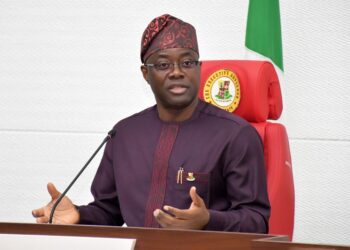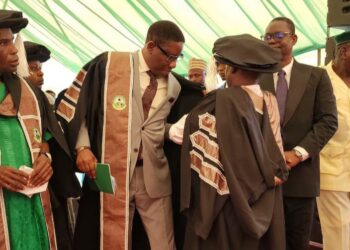A prominent Nigerian lawyer, Aare Afe Babalola, SAN, has donated £10 million to King’s College London, the college disclosed on its website.
The post reads:
King’s has received £10 million from Nigerian philanthropist and lawyer Aare Afe Babalola to establish the Afe Babalola African Centre for Transnational Education.
The new centre will enable young Africans to access education and opportunities that they would otherwise not be able to have. The vision for the Centre is based on the power of education to empower and enable Africa’s talented young people to make meaningful contributions to their communities and the world.
The Centre will offer blended and online programmes, ensuring access for students whose journey to higher education has been disrupted by conflict, displacement, or other transitions.
It will also offer post-graduate-level modules that can be brought together to create professionally recognised qualifications, from diplomas to Masters’s degrees.
Aare Afe Babalola’s donation will also provide scholarships alongside other funding partners to support bright students who would otherwise be unable to access these programmes. This will generate valuable knowledge about the nature and impact of transnational education on Africa’s development.
A bespoke programme for Africa will be developed in partnership with the University of London and an alliance of leading African universities. Modules will focus on topics that give talented young people society-relevant knowledge and skills to improve their lives, communities, and futures, such as law, health, engineering, peace and security, and leadership.
This vision is inspired by Aare Afe Babalola’s own experiences of growing up without easy access to high-quality education and benefitting from the transformative power of remote learning. This allowed him to study from his home in Nigeria and graduate with economics and law degrees from the University of London.
Building on a longstanding commitment to Africa at King’s and the University of London
This partnership will build on King’s and the University of London’s long-standing commitment to Africa and their legacy of true collaboration with African academics and institutions to deliver education and impactful research partnerships in the region for the benefit of all.
A key example is the African Leadership Centre, established at King’s and in Kenya in collaboration with the University of Nairobi to develop a new community of African leaders, generating cutting-edge knowledge for peace, security, and development in Africa. Another is the University of London’s long-standing relationship with Nigeria’s National Universities Commission, which co-delivers annual symposia for higher education leaders.
King’s has also developed a new doctoral programme in Engineering in collaboration with the University of Makerere, which launched earlier this year. This programme provides innovative training with industry placements. A joint PhD in Engineering is also in development with the University of Pretoria, building on a successful joint programme in leadership and security studies.
Further, King’s Global Health Partnerships works with health facilities, academic institutions, and governments to strengthen health systems and improve the quality of care in four countries: Somaliland, Sierra Leone, the Democratic Republic of the Congo, and Zambia.
The University of London pioneered distance learning in the 19th century and today provides online and distance education programmes to 45,000 learners studying in their home countries worldwide. Aare Afe Babalola was one such student, a powerful example of the life-changing opportunities afforded by higher education.










